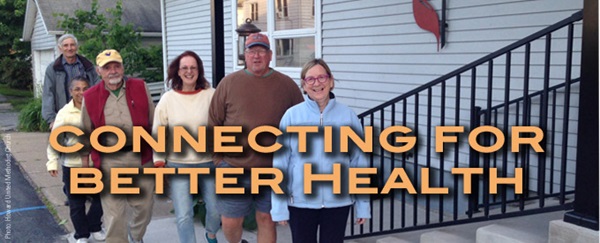Thirty years ago, 6.5 million Americans held hands from coast to coast for 15 minutes in a human chain called Hands Across America. It was a compassionate gesture with a practical side: to raise money for the homeless and hungry around the United States.
Today, United Methodists are figuratively holding hands across the world in a new gesture of love with a practical commitment to improve health in communities around the globe. Abundant Health: Our Promise to Children, a new initiative of The United Methodist Church, vows to reach 1 million children with lifesaving interventions.
Promoting Global Health
Explore more United Methodist ministries promoting health and wholeness across the globe.
In the U.S., the initiative encourages churches to take decisive steps to reduce preventable deaths in their communities by increasing opportunities for healthy lifestyle choices. Administered by the General Board of Global Ministries, Abundant Health aims to sign on 10,000 U.S. congregations as health-promoting churches by 2020.
When a congregation signs onto the 10,000 Church Challenge, parishioners commit themselves to increase access in their communities to one or more of four key health areas: Physical activity, healthy diet and nutrition, tobacco- and drug-free living, and mental health education and promotion.
For each church that signs up — multiplied by 10,000 — this commitment can translate into fewer lives lost in their community due to unhealthy lifestyle choices. For more details, click here, and read this article to learn how even small actions can make a big difference to your health.
Howard walks: One church’s challenge to its community
In Howard, Pa. (pop. 718), United Methodists and their neighbors are lacing up their sneakers for a 10-week walking program organized by Howard United Methodist Church. In just the first week, 25 walkers, ranging in age from 10 years to 70+, racked up a total of 1,578,117 steps — 789 miles.
Howard UMC was among the first U.S. congregations to sign onto the 10,000 Church Challenge. For the Rev. Craig Q. Rose, pastor of Howard UMC, the decision was simple.
“The challenge of living a healthy lifestyle is a very real and present need to people, and one the community of believers can help with,” he said. “That’s God showing his love for people through his 21st century church!”
Even before Abundant Health was approved at General Conference 2016, Howard UMC was committed to healthy living. The walking program is in its third year (the step total in 2015 was 20 million, more than 10,000 miles). And the church was already offering yoga classes and mid-week chair massages to help the community manage stress and other issues.
The idea for the walking program “rose organically from conversations,” Rose said.
Finding support in local connections
Because Howard is located just 30 miles from Penn State University, the congregation availed itself of a valuable resource. “I knew somebody who knew somebody in the Kinesiology Department who happened to work on using houses of worship to promote healthy lifestyles,” said Rose.
That contact, Associate Professor Melissa Bopp, was already intrigued with the intersection of faith communities and health. “I was interested in how the close social networks of churches — between members and also with members and leaders — seemed to help people become healthier,” she said.
Dr. Bopp and her students helped Howard UMC with information on nutrition, creating a workout plan, and facilitating maps of local walking trails. They also helped the walkers set up a website to track their status, develop logbooks to record their steps, and recommended a good, low-cost pedometer.
The church also reached out to their Susquehanna Annual Conference for support and received a $500 health ministries grant. They used the grant to purchase pedometers for each of the walkers.
Before the program kicked off, Howard UMC members actively promoted it. They talked it up in services, wrote about it in the church’s bulletins and newsletters, and shared information with other faith communities and local media outlets that promote community events for free.
Benefits
“The walking program has motivated me to walk when I would prefer to stay sedentary,” said congregation member Sue Repine. “It’s like counting calories: You’re just more vigilant when you are keeping track.”
Repine set her goal at 10,000 steps a day. “Knowing I will be recording my steps makes me walk more. If I get to the end of the day and I’m short on steps, I’ll go get on the treadmill or walk around the house until I get to 10K,” she said. “I find that 10K steps a day is critical to maintaining my weight.”
Rose reckoned that since the program began, many members of the congregation have come to value exercise and are more active. “I believe there is an unstated, though real, appreciation that their church supports their attempts to exercise and, by extension, that God supports them, too!” he said.
The pastor’s advice for other congregations pondering their commitment to healthy living? “It really is very easy to get started! Many people are looking for a little nudge, a little help in motivating themselves. Get some pretty good pedometers, and away you go!”
Visit the Abundant Health: Our Promise to Children web page and sign onto the 10,000 Church Challenge.
*Olusimbo Ige, M.D., M.S., M.P.H. is executive director of the Global Health program of the General Board of Global Ministries. Linda Unger is senior writer.
Originally published by General Board of Global Ministries, June 2016

